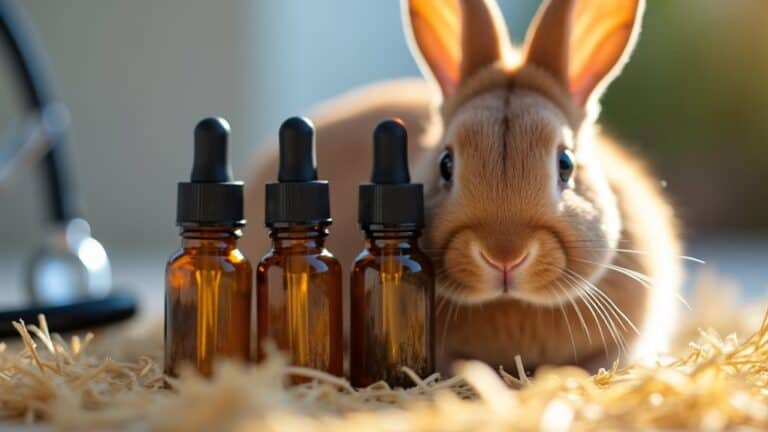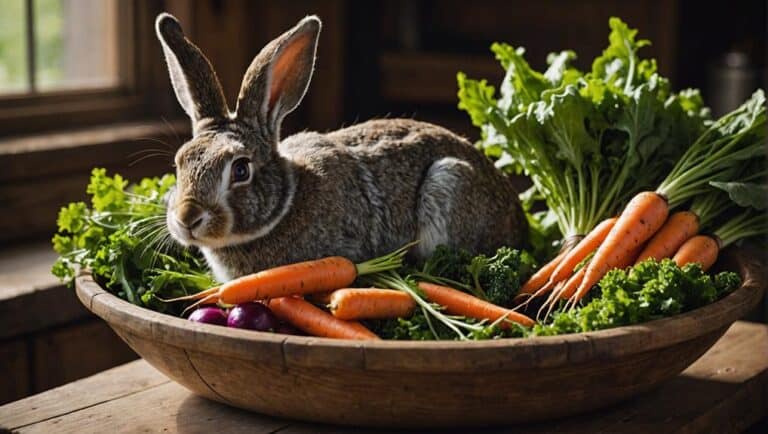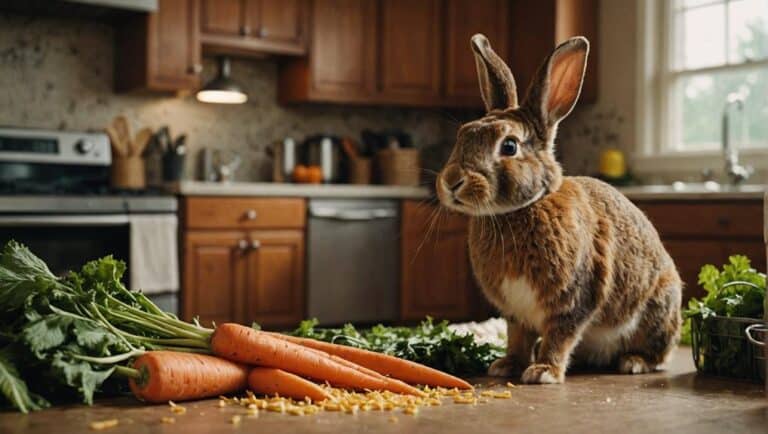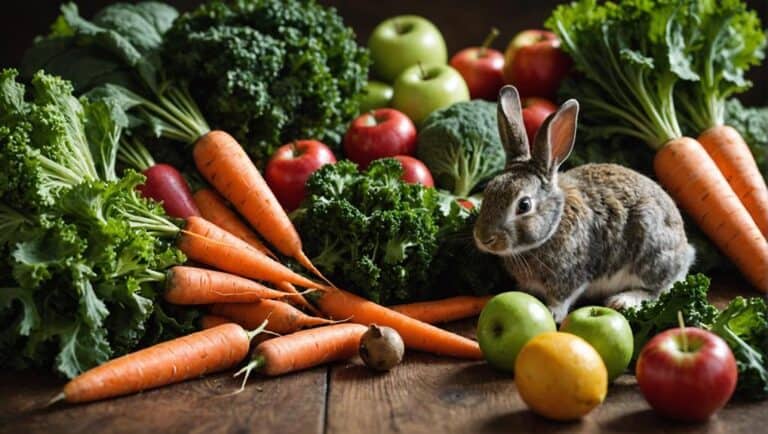You might not realize how vital fresh veggies are for your rabbit's dental health. Their unique teeth continuously grow, making it essential for them to chew on fibrous foods that naturally wear down their teeth. Incorporating a variety of crunchy vegetables into their diet not only keeps their teeth in check but also provides essential nutrients. But what specific veggies should you include, and how do they affect your rabbit's overall well-being? Understanding these aspects can make a significant difference in your pet's health.
Contents
Unique Rabbit Teeth Characteristics
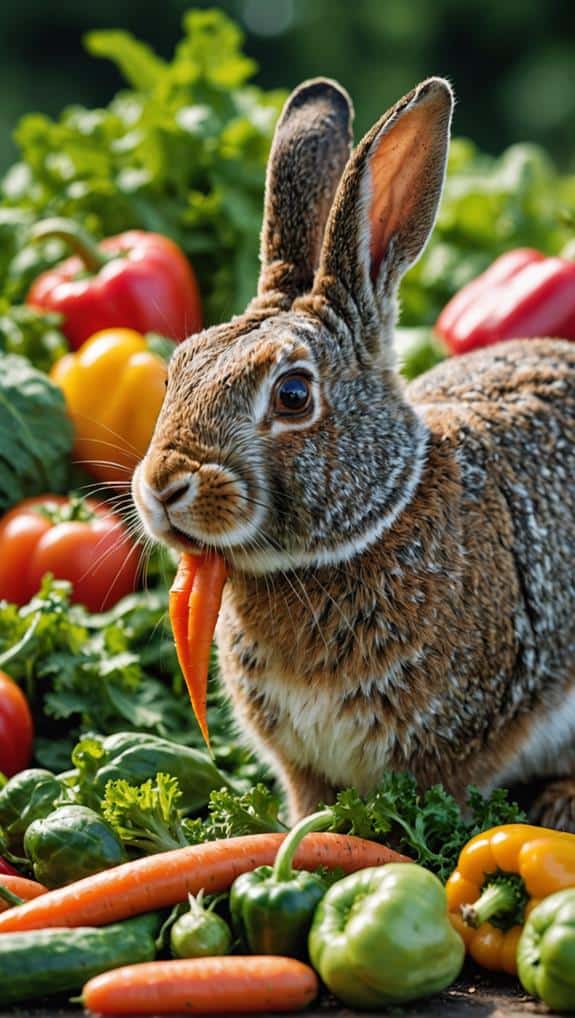
Rabbits possess unique dental characteristics that play a significant role in their overall health. Their teeth, including incisors and molars, are open-rooted, meaning they continuously grow throughout their lives at an average rate of 2 mm per week. This growth necessitates constant wearing through chewing, which is essential to preventing overgrowth and associated dental issues. The lack of distinct roots allows rabbits to naturally wear down their teeth when they consume a high-fiber diet, particularly from important sources like hay, which constitutes a substantial part of their nutritional needs the importance of hay.
The enamel on rabbits' teeth is only present on the front surface, while the back consists of dentin. This anatomical feature emphasizes the significance of proper grinding action during chewing. A well-balanced diet rich in fibrous materials helps maintain dental health and prevent malocclusion—misalignment of teeth that can lead to severe complications.
Incorporating fresh veggies into their diet is essential for promoting healthy chewing behaviors. By ensuring that your rabbit has access to an appropriate high-fiber diet, you not only support their dental health but also enhance their overall well-being. Prioritizing these unique dental characteristics will lead to a happier, healthier rabbit.
Role of Fresh Veggies
Fresh vegetables are essential for your rabbit's nutritional intake, providing important vitamins and minerals that support overall health.
The crunchiness of dark leafy greens not only satisfies their chewing instinct but also promotes natural dental wear, ensuring their teeth stay properly aligned.
Additionally, incorporating high-fiber options like fresh veggies can support digestive health, which is critical for preventing obesity and other health issues in rabbits.
a primary fiber source can help maintain their overall well-being.
Incorporating a variety of these veggies can enhance their diet and help prevent dental issues, keeping your furry friend healthy and happy.
Nutritional Benefits of Vegetables
A vibrant selection of fresh vegetables plays an essential role in maintaining the nutritional health of rabbits. These vegetables provide crucial vitamins and minerals that bolster their immune systems and overall well-being, complementing their high-fiber diet.
Leafy greens, such as kale and romaine lettuce, are particularly beneficial, encouraging your rabbit to chew and naturally wear down their continuously growing teeth. Additionally, incorporating a variety of fresh veggies aligns with the core diet components for American bunnies, ensuring a balanced nutritional intake.
The crunchy texture of fresh veggies is key to promoting dental health. As your rabbit grinds and chews through these vegetables, it helps prevent sharp tooth points and malocclusion, reducing the risk of dental problems.
By introducing a diverse range of vegetables, you not only keep their diet interesting but also encourage a balanced intake of nutrients essential for preventing dietary-related dental issues.
Additionally, fresh vegetables contribute to hydration, ensuring your rabbit receives the necessary moisture along with crucial nutrients. When fed in moderation, these fresh options support dental health while enriching your rabbit's overall diet.
Crunch for Dental Health
Incorporating a variety of crunchy vegetables into your rabbit's diet plays a significant role in promoting dental health. Fresh vegetables, such as bell peppers and celery, not only offer essential vitamins and minerals but also provide the necessary crunch that helps wear down your rabbit's teeth naturally. This chewing action is crucial in maintaining proper dental alignment and preventing overgrown teeth.
A well-balanced rabbit diet should include fresh veggies, comprising 5-15% of their overall intake. Dark leafy greens like kale and romaine lettuce are excellent choices, enriching your rabbit's diet while stimulating the chewing behavior important for dental health. These textures encourage your rabbit to engage in natural grazing, which further aids in preventing dental issues.
It's important to avoid sugary or starchy vegetables, as these can lead to tooth decay and malocclusion, negating the benefits of fresh, crunchy options.
Nutritional Benefits of Fresh Greens
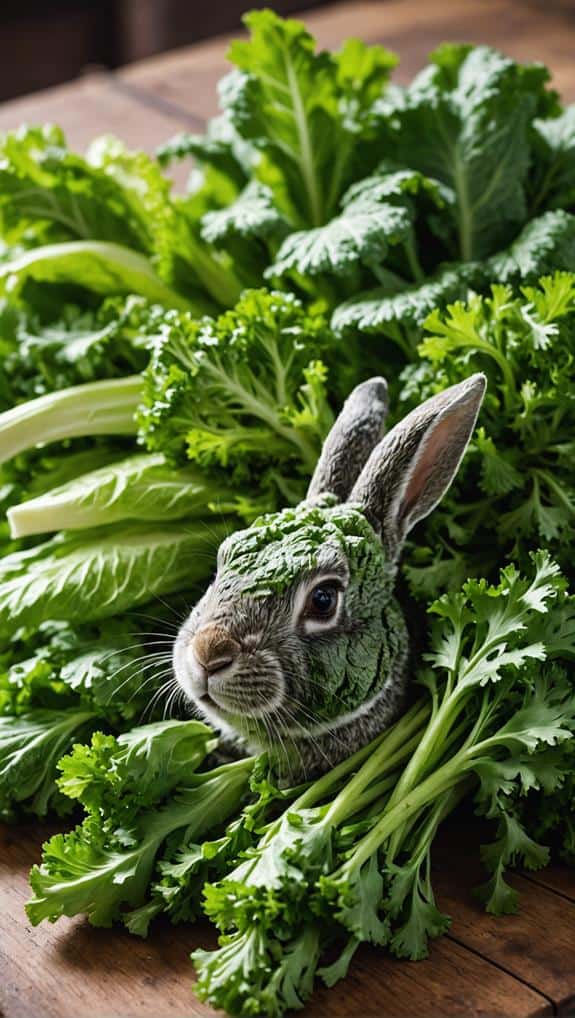
Leafy greens are crucial for your rabbit's health, offering a wealth of vitamins and minerals that promote strong teeth and gums. Fresh vegetables, particularly dark leafy greens like kale and romaine lettuce, provide essential nutrients such as vitamin A and calcium, which support overall wellness and contribute considerably to dental health. These nutrients help maintain strong teeth and healthy gums, reducing the risk of dental issues.
The crunchy texture of leafy greens isn't just enjoyable for your rabbit; it aids in the mechanical wear and alignment of their teeth. This natural chewing action helps prevent overgrowth and misalignment, which can lead to serious health problems.
Including a variety of greens in your rabbit's diet guarantees a diverse nutritional intake, optimizing their health and vitality. It's recommended that fresh vegetables comprise 5-15% of your rabbit's diet. This inclusion not only enhances their nutritional profile but also offsets the risk of dental problems that arise from insufficient chewing opportunities.
Importance of Fiber in Diet
Fiber plays an indispensable role in your rabbit's diet, serving as the cornerstone for their digestive health and dental maintenance. A high-fiber diet should make up at least 80% of what your rabbit eats, primarily through unlimited access to grass hay. This promotes constant chewing, which is essential for naturally grinding down their continuously growing teeth—about 2 mm per week.
Incorporating fresh leafy greens into the diet provides important vitamins and adds the necessary crunch to aid in dental wear, comprising 5-15% of their intake. Fiber-rich foods not only support gut health but also help maintain overall well-being, preventing conditions that can exacerbate dental issues.
Additionally, regular inclusion of fibrous treats like fresh herbs and safe branches can enhance dental health by stimulating chewing behavior. This constant chewing is critical for preventing overgrown teeth and related complications.
Preventing Dental Problems
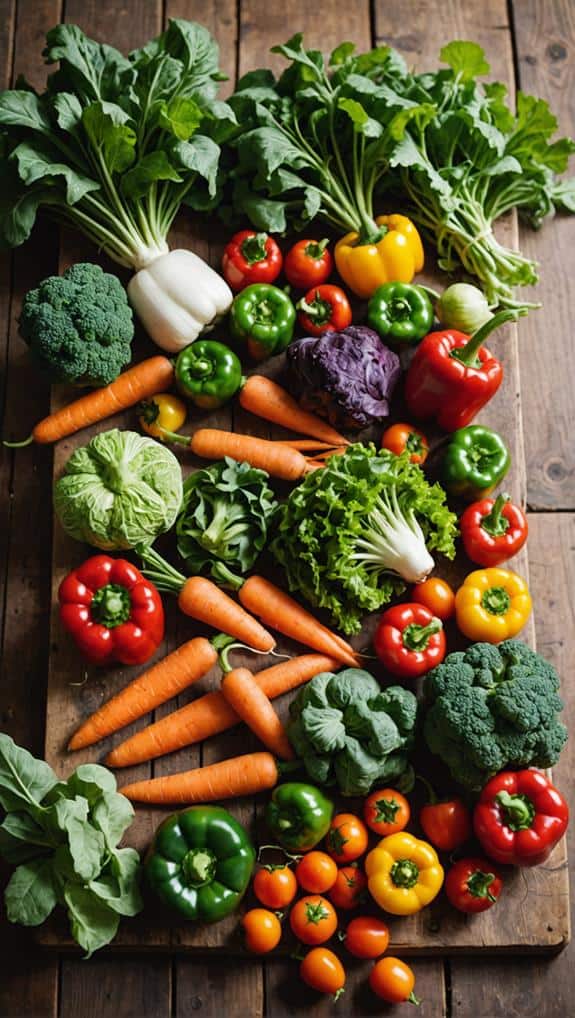
Maintaining a diet rich in fresh veggies is essential to preventing dental problems in rabbits. Fresh vegetables, especially dark leafy greens like kale and romaine lettuce, provide important nutrients and the crunch that encourages natural wear on their teeth, thereby preventing overgrown teeth. In addition to fresh veggies, it is crucial to limit the intake of damaging foods for pet teeth, such as sugary treats and processed snacks. These foods can lead to plaque buildup and contribute to dental decay, ultimately affecting your rabbit’s overall health. By prioritizing a balanced diet and avoiding harmful options, you can ensure your rabbit has strong teeth and a happy, vibrant life.
Including a variety of these fresh vegetables guarantees your rabbit receives significant vitamins and minerals that contribute to overall dental health, reducing the risk of dental diseases.
It's important to feed veggies in moderation, ideally making up 5-15% of their diet. This balance helps maintain low-calcium and low-sugar levels, which are necessary for preventing complications associated with overgrown teeth.
Additionally, high-fiber vegetables like parsley and cilantro promote chewing, which is crucial for proper dental alignment and prevents malocclusion.
Encouraging Natural Chewing Behavior
To support your rabbit's dental health, understanding the mechanics of chewing is essential.
Fresh vegetables not only provide the necessary crunch for natural chewing but also facilitate the wear on their ever-growing teeth.
Chewing Mechanics Explained
Understanding the mechanics of rabbit chewing is essential for promoting their dental health. Rabbits can perform up to 120 jaw movements per minute, which is critical for effective chewing and maintaining proper teeth alignment.
Their chewing mechanics involve both vertical and horizontal movements enabled by strong jaw muscles. This capability helps naturally wear down their continually growing teeth.
Feeding your rabbit fibrous materials, especially fresh vegetables, stimulates dental wear and encourages healthy oral hygiene. A proper chewing technique is fundamental as it prevents dental issues like malocclusion and overgrown teeth, which can greatly impact your rabbit's ability to eat and thrive.
When rabbits engage in natural chewing behavior through crunchy veggies, they support their overall dental health by ensuring their teeth remain aligned and properly worn down.
Natural Dental Maintenance
Encouraging natural chewing behavior in rabbits is important for their dental health, and incorporating fresh vegetables into their diet is one of the best ways to achieve this. Fresh vegetables provide the important crunch that stimulates chewing, which is essential for wearing down your rabbit's continuously growing teeth.
Leafy greens like kale and romaine lettuce not only engage their chewing instincts but also promote healthy wear on both incisors and cheek teeth.
By introducing a variety of fresh veggies, you diversify their diet while enhancing their natural foraging and chewing activities. The fibrous texture of these vegetables aids in maintaining proper teeth alignment and helps prevent dental problems such as malocclusion. Regular chewing is critical for managing tooth growth effectively.
When fresh vegetables are combined with a high-fiber hay diet, they support your rabbit's overall dental health by facilitating natural grinding. This process reduces sharp edges on teeth, further preventing potential issues.
Final Thoughts
Incorporating fresh veggies into your rabbit's diet isn't just important—it's absolutely essential for their dental health! Think of those crunchy bell peppers and leafy greens as nature's toothbrushes, battling tooth overgrowth like superheroes. By ensuring your furry friend has a diet rich in fresh produce, you're not only preventing dental disasters but also giving them a tasty treat they'll love. So, load up on those veggies and watch your rabbit's teeth shine brighter than a thousand stars!

